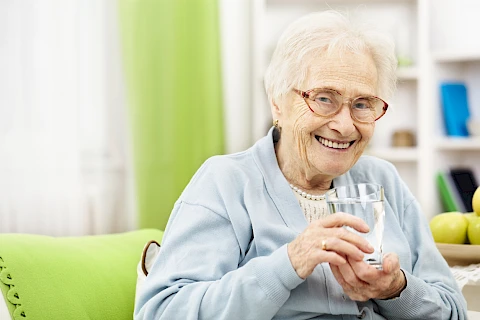
Staying hydrated is essential for maintaining good health. However, seniors may struggle with hydration, as the body's ability to retain water naturally declines with age, increasing their risk of dehydration. Caregivers can help prevent dehydration by monitoring signs of fluid loss and promoting daily hydration habits. Our team at Senior Helpers Durham Region has some tips to help families and caregivers recognize and manage the signs of dehydration.
Why Is Dehydration a Big Deal for Seniors?
Seniors are at a higher risk of dehydration due to several reasons. As seniors age, they often experience a diminished sense of thirst, meaning they may not feel thirsty even when their body needs fluids. Additionally, medications commonly prescribed to seniors, such as diuretics, can contribute to fluid loss. Chronic illnesses, reduced kidney function, and mobility issues that make it difficult to access fluids are also factors that increase the risk of dehydration in the elderly.
What Are the Signs of Dehydration in Seniors?
Recognizing the early signs of dehydration in seniors is crucial. Physical signs may include:
- Dry mouth
- Sunken eyes
- Reduced skin elasticity
- Dark, concentrated urine
Behaviourally, seniors may display confusion, dizziness, or fatigue. Caregivers should be vigilant, as seniors may not always express that they are unwell. Early detection can prevent serious complications, so it's important to be aware of these signs.
Encouraging Fluid Intake
There are practical strategies that help prevent dehydration and encourage seniors to drink more fluids. Always keep a glass of water within reach and offer fluids throughout the day, not just at mealtimes. Use a variety of beverages such as herbal teas, flavoured water, or natural fruit juices to make drinking more appealing.
Incorporating fruits and herbs like lemon, mint, or cucumber can also enhance the taste of water and encourage more frequent consumption. Additionally, serving drinks in visually appealing glasses or cups can enhance the drinking experience.
Monitoring Hydration Status
Consistently monitoring fluid intake can help prevent dehydration in seniors. Caregivers can use tools like hydration charts to track the amount of fluids consumed throughout the day. Setting up a hydration schedule helps ensure that seniors drink fluids at regular intervals. This schedule should be flexible yet consistent, adapting to seniors’ daily routines and preferences. Keeping a record of urine color can also provide insights into hydration status, as darker urine may indicate dehydration.
Hydrating Foods to Include in Diet
Incorporating foods with high water content into daily meals is another effective way to prevent dehydration in seniors. Fruits such as watermelon, strawberries, and oranges are excellent choices. Vegetables like cucumbers, tomatoes, and lettuce also contribute to fluid intake. Soups and broths not only provide warmth and nutrition but also count towards daily fluid goals. Including these foods in seniors’ diets can make a noticeable difference in their overall hydration levels.
Make Hydration a Priority
Proper hydration is a key component of senior health, and proactive management can prevent serious health issues related to dehydration.
At Senior Helpers Durham Region, we support families in providing exceptional care. For personalized senior care solutions in Oshawa, Pickering, Port Perry, Uxbridge, and Whitby, contact us today. Together, we can ensure that your loved one remains healthy and hydrated.